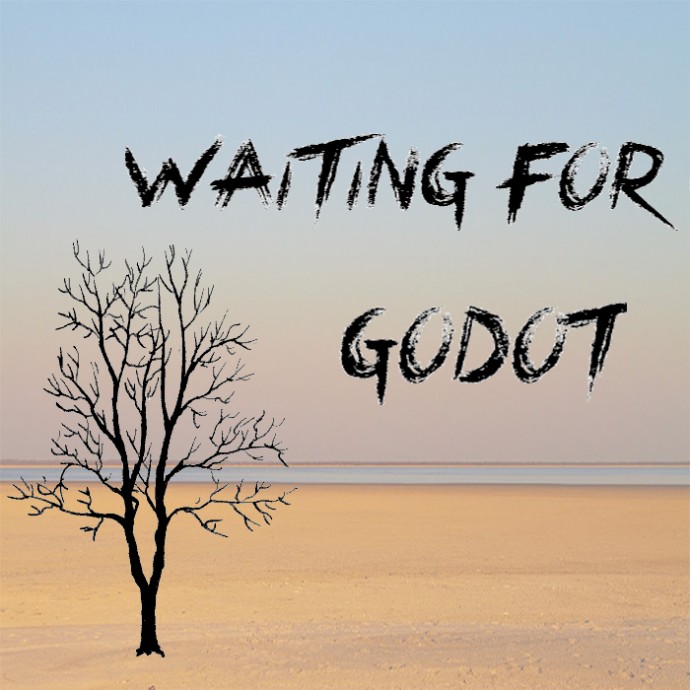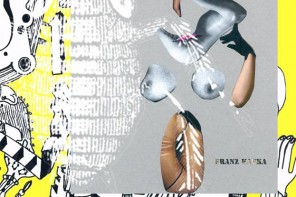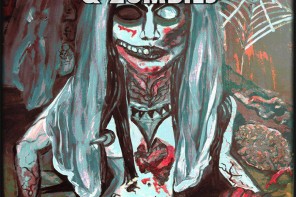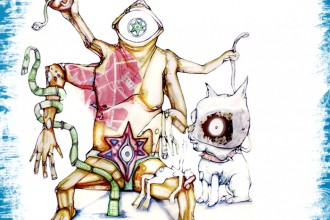The play Waiting for Godot by Irish playwright Sameul Beckett is an absurdist piece of drama in which the main characters, Vladimir and Estragon, are condemned to wait ad infinitum, enveloped in a vacuum devoid of any tangible evidence of time and place, cursed to endlessly reiterate the moment.
This week’s text exploration comes in the form of an additional act to the play’s original two nearly identical acts. If Beckett had decided to break the pattern of pairs in his original play by adding an auxiliary third act, it would likely not differ much from the initial two. “The essential doesn’t change,”[1] but this third act is meant to highlight Beckett’s style and Vladimir and Estragon’s poetic dialogues, rhythm, and mirrored lines. Extracts from the original play have been adapted to parallel what is being said and done in the previous acts. Shakespeare’s language and style has been quoted, paraphrased, and imitated while leaving out his iambic pentameter, rhythm, and eloquence in another character, Pozzo’s, lines, emphasizing the effect of isolation on a disintegrating mind gone neurotic due to excessive waiting.
As in Beckett’s original logorrhea, the speech in this third act includes similar ideas present in the play such as that of an enigmatic and callous ‘God’, together with the stereotypes around ‘God’ (namely that of a white-bearded man who lives in heaven, situated somewhere in the sky). The characters appear to be at the cruel mercy of some external force, surrounded by a “dreadful” silence. It is exactly these ideas of eternal waiting as a form of punishment, the helplessness of the characters, and the significance of the meaning (or lack thereof) of words, and the general reflection on absurdist philosophy that this third act attempts to embody.
Act Three
“Next day. Same time. Same place.”[2]
ESTRAGON leaning against the tree. VLADIMIR pacing. ESTRAGON takes off his boots.
ESTRAGON: [Stares into boot.] What do what do.
VLADIMIR: What?
ESTRAGON: It wasn’t a question.
VLADIMIR: It was. [Pause, thinking.] Rhetorical.
ESTRAGON: What?
VLADIMIR: Undeniable.
ESTRAGON: Have you a carrot?
VLADIMIR: You at the last one, remember?
ESTRAGON: I did not.
VLADIMIR: You did. I warned you that it was the last yesterday.
ESTRAGON: You lie.
VLADIMIR: Inevitably. Like you.
[Silence.]
ESTRAGON: Come on, let’s go.
VLADIMIR: “We can’t.
ESTRAGON: Why not?
VLADIMIR: We’re waiting for Godot.”[3]
ESTRAGON: Ah. [Starts to hum.] Didi… Didi… didi… dididum… didum… dumdum… dumdum… Duddud… ud… thud…
[Humming continues, rising in tone. Carries on. Humming reaches an incredibly high pitch. ESTRAGON chokes, gasps for air. VLADIMIR pats ESTRAGON on the back. Once ESTRAGON has recovered, they embrace. POZZO enters with LUCKY, whose hair now hangs loose and is dragged along on a rope shorter than in Act One.]
POZZO: [To no one in particular.]
“It is the cause, it is the cause, my soul”[4]
That I am to be a valiant man
Bound and damned to be abused
By the fey merciful reins of destiny
Bound eternally to a fate patent
Cursed by Time’s harsh effects
Of which the source unknown.
ESTRAGON: [To VLADIMIR.] What is he saying?
VLADIMIR: [Pulls up his shoulders.] I don’t know.
ESTRAGON: Is he a poet like me? “Tear him for his bad verses”![5]
POZZO:
Ay me! Ay me!
A humble faithful servant
Abiding to the torrents of vituperation
Humility bepaints my pallor visage
With the sin, the sin of man;
That resonates through the silence
O the unbearable silence. I dare not unveil
The misery within, within, within–
[Grabs ESTRAGON.]
You! What say’st thou?
Has’t thou the answer to release me
From my suffering?
[Turns to VLADIMIR.]
My dear man, noble lord,
Some relieve, anything, I prithee…
[Pulls away from the two men who gape at him in confusion.]
O God, o God. Wherefore art thou God — O![6]
VLADIMIR: Godot? [Hopeful.] Did he say Godot?
POZZO: God — O!
ESTRAGON: Godot! He did, he did! He wants to know where Godot is!
VLADIMIR: Perhaps, he’s calling for the man with the white hair and beard and the rope?
ESTRAGON: Godot! [Hopeful.] Did he say Godot?
VLADIMIR: Godot! He did, he did! He wants to know where Godot is!
POZZO: [Looks up to the sky.]
Deny thy supreme reign and refuse thy name;
What’s in a name? That which we call a spirit
By any other name would not
Entrance man just the same?[7]
ESTRAGON: Is he not Godot? [Points to LUCKY.]
[They attentively approach LUCKY.]
VLADIMIR: His hair.
ESTRAGON: His eyes.
VLADIMIR: Like the ghosts.
ESTRAGON: Like lost souls.
VLADIMIR: They glisten.
ESTRAGON: They whisper.
VLADIMIR: They glisten.
[VLADIMIR and ESTRAGON stare at LUCKY. POZZO nervously paces in circles. He starts jumping. VLADIMIR and ESTRAGON join him. They hop in a circle. POZZO falls back on top of ESTRAGON who falls on the ground. VLADIMIR quickly moves aside. ESTRAGON falls asleep and then rolls around, thrashing. POZZO crawls towards VLADIMIR.]
POZZO:
Alms, alms, alms for a poor man
Who is no more purposeful than yourself.
Morality, morality, mortality —
VLADIMIR: No such thing.
[ESTRAGON screams in his sleep.]
ESTRAGON: The fire! The fire! Blinded by the smoke! Oh, the darkness!
[VLADIMIR shakes ESTRAGON awake.]
VLADIMIR: Gogo, Gogo! We musn’t sleep! What if Godot comes?
ESTRAGON: I had a nightmare.
VLADIMIR: No different from when you’re awake.
ESTRAGON: Pinch me.
[VLADIMIR pinches him.]
ESTRAGON: I’m still dreaming. Am I alive?
[Silence.]
VLADIMIR: I don’t know.
[POZZO lies rolled up on the ground whimpering. LUCKY lies next to him. VLADIMIR tries to push LUCKY aside, LUCKY does not move.]
VLADIMIR: A slave bound to its master.
ESTRAGON: Please move.
VLADIMIR: He won’t listen. Try again.
ESTRAGON: Get up!
VLADIMIR: Is he deaf?
ESTRAGON: [Shoving LUCKY.] Move, pig!
VLADIMIR: Let’s leave him.
ESTRAGON: [Looking at POZZO.] Shall we give him a turnip?
VLADIMIR: If you wish. Ask him.
ESTRAGON: [Cautiously.] Excuse me, Mister, a turnip. Would you like a turnip?
POZZO:
A turnip! A turnip! My honour for a turnip![8]
[ESTRAGON stares at the turnip and proceeds to munch on it.]
VLADIMIR: You pig. You’ll finish them all this way!
ESTRAGON: What? It’s my breakfast.
VLADIMIR: It’s already past noon!
ESTRAGON: But I haven’t had any food today, so it’s my breakfast.
VLADIMIR: No one eats breakfast in the afternoon.
ESTRAGON: It’s not the afternoon.
[ESTRAGON and VLADIMIR glance up at the sky. POZZO clumsily attempts to get up, leaning LUCKY. LUCKY obediently follows as they slowly stumble off the stage.]
VLADIMIR: Wait! Where are you going?
POZZO: “I can’t go on, I’ll go on.”[9]
ESTRAGON: Don’t leave us!
POZZO: [Disappearing into the distance.]
Frailty, thy name is man!
A little month, or ere those souls were old
With which you follow’d my poor memory.[10]
[POZZO and LUCKY exit. VLADIMIR and ESTRAGON remain behind, staring with their backs to the audience for a few minutes as POZZO and LUCKY leave.]
ESTRAGON: [Still with his back towards the audience.] Me eyes hurt.
[Silence.]
ESTRAGON: [Louder.] I said — !
VLADIMIR: [Interrupts.] Shh!
ESTRAGON: [In a loud whisper.] Why?
VLADIMIR: [Quietly.] It’s disrespectful.
ESTRAGON: [Back to his normal voice.] To what?
VLADIMIR: Godot.
ESTRAGON: But then he’ll never know that we’re here!
VLADIMIR: But then we’ll never know if he’s here!
ESTRAGON: Maybe we should shout. Or cry. Or not fast. Or tear our clothes. Maybe then he’d come.
[Silence. ESTRAGON starts to wail loudly. Stops abruptly, turns, and glares at audience.]
ESTRAGON: He’s deaf!
[Wails again, this time with exaggerated conviction and determination. Stops wailing and glares at audience. Stomps his foot in frustration. Accidentally stubs his toe against a rock. Begins to cry.]
ESTRAGON: Why can’t he come? I want to go!
VLADIMIR: [Turns around, knocks off ESTRAGON‘s hat. Angrily.] Stop it! You can’t!
ESTRAGON: Why not?
VLADIMIR: We’re waiting for Godot.
ESTRAGON: Oh.
[Silence. ESTRAGON knocks off VLADIMIR‘s hat in return. Both scramble after each other’s hats that are rolling around on the stage.]
ESTRAGON: [Picking up VLADIMIR‘s hat. Peers in it and scrambles around with this hand in it. Excitedly.] A louse!
VLADIMIR: [Doing the same with ESTRAGON‘s hat.] Dust.
ESTRAGON: It’s been eating away at your brain!
[They sit on the ground. ESTRAGON grins.]
ESTRAGON: [Happily.] Such findings! I have never been so excited!
VLADIMIR: [Sarcastically.] And what more!
ESTRAGON: What more?
VLADIMIR: That.
ESTRAGON: Hat?
VLADIMIR: No.
ESTRAGON: Oh.
[Silence.]
VLADIMIR: What if he doesn’t come?
ESTRAGON: Who?
VLADIMIR: [Frustrated.] Who?
ESTRAGON: That’s what I was asking!
VLADIMIR: But I asked you before!
ESTRAGON: No, you did not. [Pause.] Did you? [Silence.] I can’t remember.
[Silence.]
VLADIMIR: If he doesn’t come, we’ll never be saved.
ESTRAGON: From what?
VLADIMIR: From each other. From life. Death. Oh, I don’t know.
[The BOY enters.]
BOY: Mister!
VLADIMIR: Off we go again. Yes?
BOY: I have come to bring a message from Mr. Godot, sir.
VLADIMIR: I know.
ESTRAGON: Godot?
[Silence.]
BOY: I have come to bring a message from Mr. Godot, sir.
VLADIMIR: I know.
ESTRAGON: Didi! A message from Godot!
VLADIMIR: I know.
[Silence.]
BOY: Do you want to hear it, sir?
VLADIMIR: No.
ESTRAGON: Yes.
VLADIMIR: [To ESTRAGON.] I can tell you exactly what he’s come to tell us! [Turns to the BOY.] You didn’t come yesterday, you came the day before. Or yesterday… or before. Godot is not coming this evening, he’ll come tomorrow. Whatever that may mean. You never met anyone. Mr. Godot does nothing. He has a white bear. You mind the goats…sheep — I don’t know! You don’t recognise me and you may tell Mr. Godot that you indeed saw us and that we are waiting for him to arrive! Tomorrow!
[The BOY exits, running. “Silence. The sun sets, the moon rises. As in Act One”[11] and Two.]
ESTRAGON: You are rude.
[VLADIMIR ignores him. Silence.]
ESTRAGON: Is it tomorrow yet?
VLADIMIR: It’s night.
[Silence.]
VLADIMIR: “Nothing to be done.”[12]
ESTRAGON: C’est ‘Comment c’est.’[13]
VLADIMIR: L’innommable.[14]
ESTRAGON: “Well, shall we go?
VLADIMIR: Yes, let’s go.
[They do not move.]”[15]
This text review is part of Textasy, Sensa Nostra’s new text reviews section. Want to contribute?
[1] Beckett, Samuel. ‘Waiting for Godot’.
[2] Ibid.
[3] Ibid.
[4] Shakespeare, William. ‘Othello’.
[5] Shakespeare, William. ‘Julius Caesar’.
[6] Shakespeare, William. ‘Romeo and Juliet’.
[7] Ibid.
[8] Shakespeare, William. ‘King Henry’.
[9] Beckett, Samuel. ‘L’innommable’.
[10] Shakespeare, William. ‘Hamlet’.
[11] Beckett, Samuel. ‘Waiting for Godot’.
[12] Ibid.
[13] Becket, Samuel. ‘Comment c’est’.
[14] Beckett, Samuel. ‘L’innommable.’
[15] Beckett, Samuel. ‘Waiting for Godot’.







